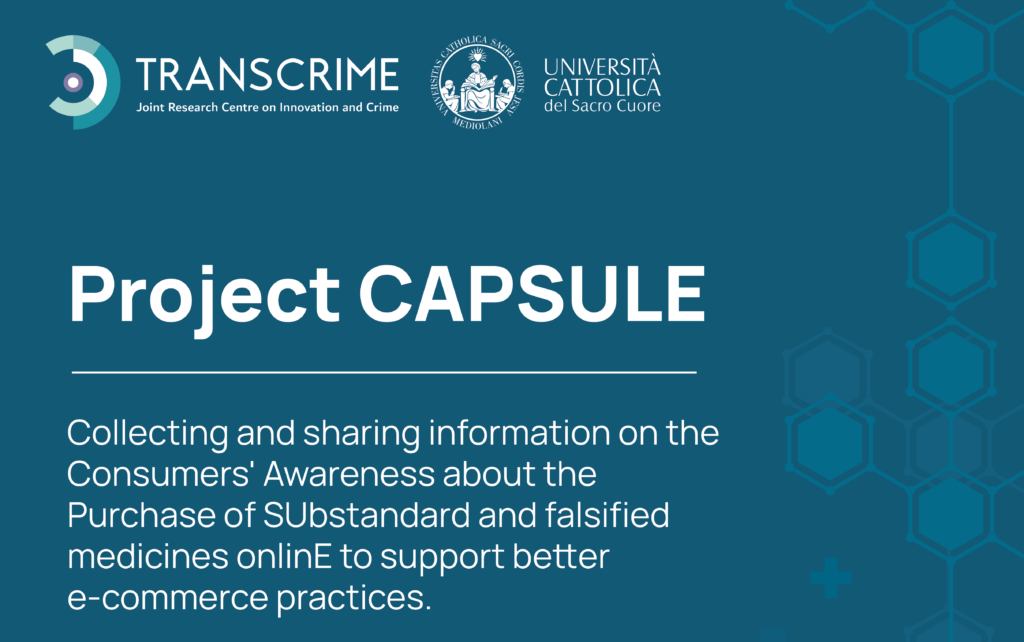
Project CAPSULE
Collecting and sharing information on the Consumers’ Awareness about the Purchase of SUbstandard and falsified medicines onlinE to support better e-commerce practices.
Marco Dugato*, 2024
*with contribution of Mirko Nazzari and Domenico Di Giorgio
Introduction
The proliferation of online sales, intensified by the COVID-19 pandemic, has significantly increased opportunities for the illicit market of substandard or falsified medicines (SFMs)(OECD and EUIPO 2020; Europol2021; Ahmed et al. 2022; ; EUIPO and Europol 2022; Jillani, Reinhard, and Hertig 2023). Criminals exploit consumers’ vulnerabilities through deceptive advertisements, posing considerable risks to public health and undermining regulatory efforts aimed at ensuring the safety and efficacy of pharmaceutical products (Winter, Saunders, and Hart 2003; Barbaranelli et al. 2015; Kennedy 2020).
Furthermore, diverse regulatory landscapes across different countries can exacerbate the problem (Sogomonjan and Forcht Dagi 2023). Stringent regulations may inadvertently limit access to legitimate channels for purchasing medicines online, thereby driving consumers toward illicit sources. Conversely, lenient regulatory frameworks may create loopholes that facilitate criminal deception, allowing illegitimate operators to thrive in an environment with minimal oversight and enforcement.
Existing efforts to combat the proliferation of SFMs primarily focus on targeting the online supply of illicit medicines, aiming to disrupt the activities of illicit vendors and websites selling counterfeit or unlicensed pharmaceutical products (Lavorgna 2015; Kennedy, Haberman, and Wilson 2018; Kennedy, Petlakh, and Wilson 2018). However, these enforcement actions often neglect to address the demand side of the market.
Understanding consumers’ experiences and exposure to SFMs online is crucial for developing effective regulatory interventions and awareness campaigns. By gaining insights into consumers’ behaviors, perceptions, and purchasing patterns, policymakers and regulatory authorities can devise targeted strategies to mitigate the risks associated with online pharmaceutical sales.
Empirical understanding of consumer awareness and experiences with purchasing substandard and falsified medicines online is limited, with most studies focusing on developing countries (Lybecker 2007; Alfadl, Ibrahim, and Hassali 2012; Barbaranelli et al. 2015; Ofori-Parku and Park 2022). However, the issue extends globally, as demonstrated by the widespread availability of fake medicinal products during the COVID-19 pandemic (Ziavrou, Noguera, and Boumba 2022; EMA 2023).
Project CAPSULE seeks to bridge this knowledge gap by investigating consumers’ exposure, awareness, and attitudes toward the online sale of medicines.
The research questions addressed by Project CAPSULE include:
- To what extent are consumers exposed to online advertisements for medicines, and how common is the purchasing of medicines online?
- What is the level of consumers’ awareness and attitude toward the sales of medicines online, as well as the associated risks?
- How proficient are consumers in distinguishing between legitimate products and SFMs advertised online?
- Which factors influence consumers’ exposure to or attitude toward the purchase of medicines online, as well as their ability to distinguish between legitimate products and SFMs?
By investigating these research questions, Project CAPSULE aims to provide policymakers, regulatory authorities, brand owners, and e-commerce platforms with insights into the demand for medicines online. These insights can inform the development of targeted interventions, including awareness campaigns, regulatory enforcement measures, and improvements to online product listings, to effectively combat the proliferation of SFMs and safeguard public health.
This research was conducted independently by the Università Cattolica del Sacro Cuore (UCSC)-Transcrime with the financial support from Michigan State University’s Center for Anti-Counterfeiting and Product Protection (A-CAPP) through external research gifts.
Copyright © 2024 Board of Trustees at Michigan State University. All Rights Reserved.
